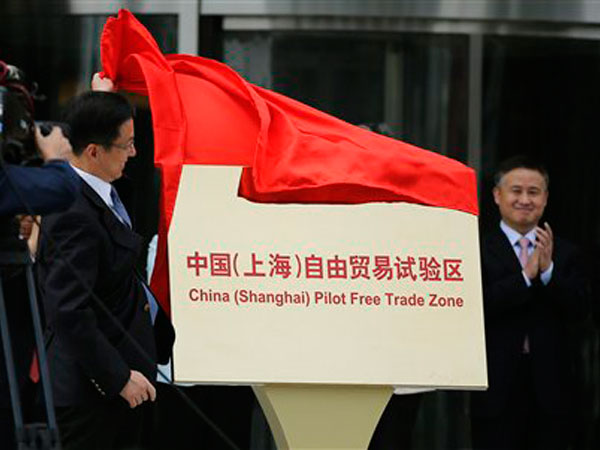
Shanghai Municipality Communist Party Secretary Han Zheng, left, inaugurates the Shanghai Free Trade Zone during a ceremony in Pudong district, Shanghai Sunday, Sept. 29, 2013. China’s first pilot free trade zone started operating in Shanghai on Sunday, billed as a test bed for the country’s drive to deepen economic reform and providing a testing ground for free capital account convertibility of its currency. AP
SHANGHAI – China launched a free trade zone in its commercial hub Shanghai on Sunday, state-media reported, with the project seen as a testing ground for much-needed reforms in the world’s second largest economy.
The zone, which covers 29 square kilometers (11 square miles), “started operating Sunday,” the official Xinhua news agency said, adding that it was “a test bed for the Chinese leadership’s drive of deepening market-oriented reforms and boosting economic vigor.”
The launch has been hailed as a key test of China’s ability to make long-pledged structural reforms as it attempts to shift its economic model in the face of slowing growth.
Free convertibility of China’s currency, the yuan, under the capital account on a trial basis will be allowed in the zone, according to a statement released by China’s State Council cabinet on Friday.
The zone will also trial market-set interest rates, seen by analysts as a key reform for China’s economy, according to the statement.
Restrictions on foreign investment will be eased inside the zone, which will also loosen controls on 18 service sectors ranging from finance and shipping to culture services.
Excitement over the launch has boosted stocks of Shanghai-based firms and spurred a rally in home prices and land costs in areas neighboring the zone in the past few weeks, state media have reported.
The project has been pushed by China’s Premier Li Keqiang, who took office in March, and hopes it will set a model for future reforms to be carried out nationwide, analysts and government officials have said.
China’s government has been struggling to shift the domestic economy away from dependence on big-ticket investments and more towards consumer demand as the key growth engine.
China’s economy, the world’s second largest, expanded 7.7 percent in 2012, its slowest pace in 13 years. Growth stood at 7.7 percent in the first three months of this year and slowed further to 7.5 percent in the April-June period.